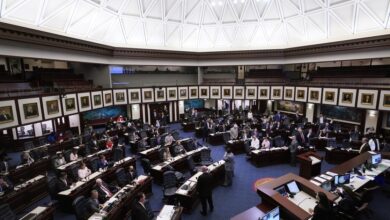Public Colleges Across the Country Are Banning TikTok on Their Networks. Here’s What That Means.

[ad_1]
Public colleges and universities across the country are barring TikTok from their internet systems as a slew of states ban the popular video app from state-owned devices. In the last two months, more than two dozen states have issued such bans, prompting many public colleges to tell students they’ll have to log out of the campus Wi-Fi if they want to use the app.
In taking action against TikTok, many governors have cited the director of the Federal Bureau of Investigation, Christopher Wray, who in early December told an audience at the University of Michigan at Ann Arbor that the app raised national-security concerns. The app’s algorithm could be used to flood the United States with misinformation, Wray said, and its user data could be harvested for espionage. TikTok is owned by ByteDance Ltd., a Chinese technology company.
Gov. Greg Gianforte of Montana, a Republican, sent a letter on January 3 to the Montana Board of Regents asking it to block TikTok’s use on Montana University System networks.
“The ability of the Chinese Communist Party (CCP) to spy on Americans using TikTok is well documented,” he wrote. “Using or even downloading TikTok poses a massive security threat.”
TikTok has been banned from state-owned devices in 27 states and is partly banned in four states, according to a CNN analysis.
Texas is one of those states. After Gov. Greg Abbott, a Republican, issued a directive last month barring TikTok from state-owned devices and networks, the University of Texas at Austin announced this week that TikTok would no longer be accessible through its campus Wi-Fi. “As outlined in the governor’s directive, TikTok harvests vast amounts of data from its users’ devices — including when, where, and how they conduct internet activity — and offers this trove of potentially sensitive information to the Chinese government,” wrote Jeff Neyland, the university’s adviser to the president on technology strategy, in an email.
The University of North Texas and the University of Texas at Dallas have also blocked access to TikTok on their Wi-Fi networks. In Alabama, Auburn University blocked TikTok through campus networks in December, after Gov. Kay Ivey, a Republican, banned the app from all state-government networks and devices.
The colleges are responding to executive action, but limiting access to the app may be in their best interests, said Karen North, a clinical professor of digital social media at the University of Southern California’s Annenberg School for Communication and Journalism. North said keeping TikTok off campus networks will help colleges protect their servers from data breaches or being hacked.
“The universities are really thinking long and hard right now about the fact that when people log on to the secure network at a university, and then they have apps on their phones that might penetrate that network, there’s a lot of really sensitive information that exists within that network,” North said.
Still, colleges have increasingly turned to TikTok to reach prospective students. A study by the Pew Research Center found that 67 percent of teens use TikTok.
A Tool for Teaching and Recruiting
That trend has created challenges for colleges seeking to follow their governors’ orders. The University of Central Oklahoma joined the University of Oklahoma and Oklahoma State University in blocking access to TikTok through campus networks in December, following an executive order by Gov. Kevin Stitt, a Republican.
In an email to the Central Oklahoma community, the university’s communications team recommended that any existing campus TikTok accounts be deactivated.
Adrienne Nobles, vice president for communications and public affairs, said the university is exploring ways to continue promoting itself on TikTok, while observing the governor’s executive order.
“We’ve got a fantastic team of recruiters on the ground, great technology to support our recruitment strategies, and a strong presence on other social-media platforms,” Nobles said via email.
The Texas A&M University system has also banned TikTok access through its campus networks, even though some of its academic departments have popular accounts. The physics and astronomy department on the College Station campus has over 1.5 million followers on TikTok, where scientists share educational videos of their experiments. The account’s home page now directs viewers to YouTube, where the scientists continue to upload videos.
Kate Biberdorf, an associate professor of instruction in the University of Texas at Austin’s chemistry department, runs a popular TikTok account, with over 194,000 followers, that shares videos of science experiments.
Biberdorf, who uses TikTok in teaching and to get people interested in science, said it’s unusual for UT-Austin to limit educational tools on campus.
“There are a lot of different avenues that TikTok has, and I know it can be silly, and I know it can be goofy, but it can also be used as an educational tool and really help our students see some experiments that I can’t possibly do in the classroom, but I can 100 percent do safely in my home studio,” Biberdorf said.
She plans to continue making TikTok videos, which she can still film while disconnected from the campus network. But she said the new rule, which she understands the university must obey, could hamper recruitment of students and faculty members.
“I do know that right now we’re in a culture in our little Austin bubble where, over all, we kind of feel like our rights are being taken away, and this was just another push in the wrong direction,” she said. “So, I think in terms of recruitment, it definitely will have an impact because all of these little things are going to add up and make a big difference.”
Aynne Kokas, an associate professor of media studies at the University of Virginia, said that as TikTok becomes more ingrained in society, it will grow increasingly difficult to regulate the company.
“The more TikTok becomes embedded in the U.S. information ecosystem, the more difficult it is to take any significant action against the company,” she said, “because then it becomes not just a question of regulating the firm, but also impacting U.S. businesses, U.S. users.”
Kokas added that she doesn’t think blocking access to TikTok on campus networks will keep students off the app.
“I would be very surprised,” she said, “if that actually works.”
[ad_2]
Source link






